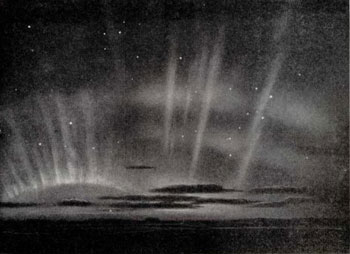De Monarchia By Dante Alighieri Book I Chapter XVI: Christ Willed to Be Born In the Fullness of Time When Augustus Was Monarch.
And it came to pass, that in those days there went out a decree from Caesar Augustus, that the whole world should be enrolled. This enrolling was first made by Cyrinus, the governor of Syria. And all went to be enrolled, every one into his own city. And Joseph also went up from Galilee, out of the city of Nazareth into Judea, to the city of David, which is called Bethlehem: because he was of the house and family of David, To be enrolled with Mary his espoused wife, who was with child. And it came to pass, that when they were there, her days were accomplished, that she should be delivered. And she brought forth her firstborn son, and wrapped him up in swaddling clothes, and laid him in a manger; because there was no room for them in the inn. Lk
CHAPTER XVI
Christ willed to be born in the fullness of time when Augustus was Monarch.
1. A phenomenon not to be forgotten attests the truth of all the arguments placed in order above, namely, that condition of mortals which the Son of God, when about to become man for the salvation of man, either awaited, or ordained at such time as He willed.1 For if from the fall of our first parents, at which point of departure began all our error,2 we survey the ordering of men and times, we shall find no perfect Monarchy, nor the world everywhere at peace, save under the divine Monarch Augustus.3 That men were then blessed with the tranquillity of universal peace all historians testify, and all illustrious poets; this the writer of the gentleness of Christ4 felt it meet to confirm, and last of all Paul, who called that most happy condition “the fulness of the time.”5 Verily, time and all temporal things were full, for no ministry to our happiness lacked its minister. But what has been the condition of the world since that day the seamless robe6 first suffered mutilation by the claws of avarice, we can read—would that we could not also see! O human race! what tempests must need toss thee, what treasure be thrown into the sea, what shipwrecks must be endured,7 so long as thou, like a beast of many heads,8 strivest after diverse ends! Thou art sick in either intellect,9 and sick likewise in thy affection. Thou healest not thy high understanding by argument irrefutable, nor thy lower by the countenance of experience. Nor dost thou heal thy affection by the sweetness of divine persuasion, when the voice of the Holy Spirit breathes upon thee, “Behold, how good and how pleasant it is for brethren to dwell together in unity!”10
[1. ] For the outline of the argument in this chapter see Orosius, Hist. 6. 22. 5.
Conv. 4. 5. 2: “The immeasurable Divine Goodness, wishing to bring back to Itself the human creature, which by the sin of the transgression of the first man had become separated from God and unlike Him, it was decreed . . . that the Son of God should descend to earth to bring about this reunion. And since at His . . . coming it behoved not only the heavens, but the earth, to be in the best condition, and the best condition of the earth is under a monarchy . . . therefore Divine Providence ordained the people and the city wherein this should be fulfilled, that is, Rome the glorious.” De Mon. Book 2 is devoted to this subject of Rome’s foreordination.
[2. ] The result of Adam’s sin Matilda touches on in her discourse with Dante on the nature of the terrestrial Paradise, Purg. 28. 91: “The highest Good, which does only its own pleasure, made the man good and for good, and gave him this place for an earnest to him of eternal peace. Through his own default he abode here little time; through his own default he changed to weeping and toil honest laughter and sweet mirth.”
Par. 7. 26: “For not enduring to the faculty that wills any curb for its own advantage, that man who was never born, in damning himself, damned all his progeny.” See De Mon. 2. 13. 1, and notes.
[3. ] In the image symbolic of human history, Inf. 14. 94 ff., Dante identifies the golden age with the reign of Augustus. Line 112: “Every part beside the gold is burst with a cleft which drips tears.”
Par. 6. 55: “Hard upon that time when the heaven wholly willed to bring back the world to its tranquil order, Caesar by the will of Rome bare it. . . . It laid the world in such a peace that Janus had his shrine locked up.”
Conv. 4. 5. 3: “Nor ever was, nor ever will be, this world so perfectly disposed as then. . . . Universal peace reigned, which never was before nor ever will be again, because the ship of human society sped over a smooth sea straight to its destined port.”
[4. ]Luke 2. 1, 14.
[5. ]Gal. 4. 4: “But when the fulness of the time was come, God sent forth his Son, made of a woman, made under the law.” Cf. Eph. 1. 10.
[6. ]John 19. 23: “Now the coat was without seam, woven from the top throughout.” Dante uses the figure here to denote the undivided empire. The papal party used the same figure in their arguments to denote undivided ecclesiastical authority. De Mon. 3. 10. 4.
[7. ] This figure of the ship of human society is found in Conv. 4. 5. 3 (see note 3 of the present chapter), Purg. 6. 77: “Ah, Italy . . . ship without a pilot in a great tempest,” etc.
[8. ] This mixed metaphor of Dante’s, “dum bellua multo-rum capitum factum,” is a further illustration of the evil of multiplicity and lack of concord in men’s wills. Cf. De Mon. 1. 15. 1, and note. Beside the evil of many discordant wills, there is reference to the evils that may be included under the term “bestial.” See Conv. 4. 5. 3: “Vile beasts that pasture in the shape of men.” See especially Inf., cantos 12-17. Also note 14, De Mon. 2. 3.
[9. ] The two intellects were the possible or apprehensive intellect, and the active intelligence. Cf. De Mon. 1. 3. 2. To these two powers Dante adds that of affection.
Purg. 18. 55: “Man knows not whence comes the understanding of the first cognitions, and the affection of the first objects of appetite.”
Par. 1. 120: “Creatures . . . that have intellect and love.”
Par. 6. 122; 13. 120; 15. 43: “When the bow of his ardent affection was so slackened that his speech descended towards the mark of our understanding, the first thing that was by me understood was, ‘Blessed be Thou, threefold and one.’ ” L. c. 15. 73: “The affection and the thought when as the first Equality appeared to you, became of one weight for each of you.”
The two intellects and the affection are the threefold means given to man by which he may arrive at the unity which is goodness in completeness, and there may see and know God. This suggests the means by which Dante achieves his vision in the Divine Comedy—Virgil, Beatrice, and St. Bernard.
[10. ]Ps. 133. 1.








Comments
Post a Comment